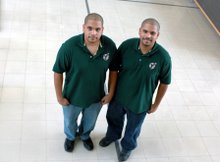During this time, our source of electricity was a 12 Volt battery that powered the lights, bilge pumps and vital onboard instruments. And our only source of electronic entertainment was a car radio that my dad installed to keep us plugged into society. For refrigeration, we had a big insulated icebox that was never full.
Leading such a basic life meant that we didn't have huge stockpiles of food and gave us much flexibility in answering one of our basic economic questions: What do we eat? We kept dry stock and canned foods that were simple in preparation. So, if we wanted to eat a meal that consisted of fish, all we needed was to get the meat. We would simply jump in the dinghy and go around the point just east of us (approx 100 yards away) and drop a line. The whole family can go and within a few minutes of having four lines in the water we'd have the meat for dinner. That was quicker than going to the store. What a simple, hassle-free life?! We didn't have to get aggravated by traffic or long lines at the check-out counter!
Fast forward a few years later to after Hurricane Katrina in Miami where we lost over $100 worth of food due to the power outage. This prompted us to be more mindful of our purchasing habits and over the course of the next few weeks was better prepared for Hurricane Wilma. We essentially took a back to basics approach where we kept a low inventory of refrigerated foods. Here's a thought: have the supermarket store your food and bear the burden of maintaining refrigeration. This minimizes the risk of losing food during the hurricane season - especially during the height of storm activity in late August to mid September. And this action also reduces the need to refrigerate many items and gives you the flexibility to engage in more cost saving tactics. You can essentially lower your electric bill too.
It seems to me that we had the makings of a just-in-time inventory mechanism similar to what Toyota uses. Could we have been onto something? Makes me wonder.









1 comment:
I must add that this boat was bought damaged by Tropical Storm Gilbert in 1988. We fixed it up but never replaced the seized up engines. Therefore, charging the 12 Volt battery was always a challenge we overcame.
Post a Comment